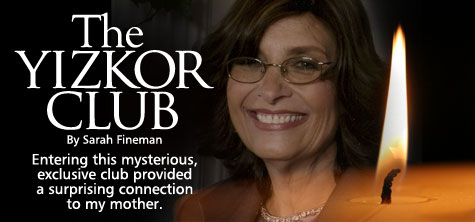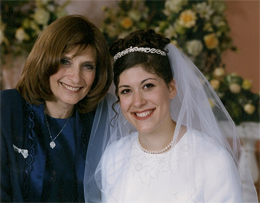 Iran’s Attack on Israel
Iran’s Attack on Israel


6 min read
Entering this mysterious, exclusive club provided a surprising connection to my mother.
Mommy wasn’t from an observant background. She couldn’t read from a siddur but she rarely missed going to synagogue on Shabbat, and certainly never missed going on a holiday. I often stood by her side as she prayed. She learned to recite one or two of the prayers in Hebrew but mostly she prayed in English.
Mommy often cried when she prayed. Sometimes the tears seemed spontaneous and I wondered what it was that made her cry. Other times it was predictable; She cried at every Hallel while she sang King David’s words, “From the straits I call out to God…” Each time the cantor reached those words I inevitably looked up at her to see if this time she could make it through the two lines without crying. She never did. Each time I watched the tears slowly slide down the sides of her face and drop onto her prayer book. I knew that Mommy was calling out from her own straits, whatever they were.
There was another point in the holiday services that she would always cry. Those tears I never saw. I was never once at her side when she cried them. Those were the tears she cried during the Yizkor Club.
Outside the doors, I would hear nothing. The Yizkor Club meets in silence.
The Yizkor Club meets several times a year, on Yom Kippur, Shmini Atzeret, Passover, and Shavuot. They meet in every synagogue, in the middle of the prayer service, and everyone who is not a member of the club is asked to leave and invited back only when the Yizkor Club is through. Outside the doors, I would hear nothing. The Yizkor Club meets in silence.
After the Yizkor Club was finished, I would dutifully return to my seat to find Mommy, her eyes a little watery, her nose a little red, and her cheeks a little damp. It was obvious she had been crying.
 It isn’t actually called the Yizkor Club. But as a child I had always thought of it that way. It was something exclusive, something that Mommy was a part of but I wasn’t. It wasn’t until I got older that I realized the Yizkor Club is a “club” that no one wants to join. Its members have all experienced the death of a loved one. They all have a gaping hole in their heart.
It isn’t actually called the Yizkor Club. But as a child I had always thought of it that way. It was something exclusive, something that Mommy was a part of but I wasn’t. It wasn’t until I got older that I realized the Yizkor Club is a “club” that no one wants to join. Its members have all experienced the death of a loved one. They all have a gaping hole in their heart.
Mommy had been a member of the Yizkor Club since before I was born. She became a member when her father, Poppy Boy as he was lovingly called by his grandchildren, died. Mommy kept Poppy Boy’s memory alive through pictures and stories, her words painting vivid illustrations of his life. I always felt that I had known him, even though we never met. When she spoke about his strong hands, I could almost feel his long fingers curled around my little hand, squeezing just a bit too tight. When she described how dignified he was, I could almost hear his charming English accent.
It seemed that everything about Poppy Boy was special, including his yahrtzeit, the day he died. It's the same day as Moses', the seventh day of the month of Adar. Mommy pointed this out to me on more than one occasion. And so, on that day, the seventh of Adar, Mommy would light a yizkor candle in her father’s memory. In all of my years watching Mommy light that candle, it never once occurred to me that I might be doing the same for her on that same day.
Thirty-three years after Poppy Boy died, on the seventh of Adar, I got the call from my father telling me that Mommy only had minutes left. Mommy, who cradled me, fed me, sang to me, and wiped away my tears. Mommy, who laughed with me, danced with me, played with me, helped me with my homework. Mommy, who listened to my stories, listened to my heartache, walked me down the aisle, and watched me begin my own journey of motherhood. Mommy, the woman to whom I owed my very existence, the woman who was always there. Only minutes left and I was over an hour away away.
And then, just minutes later, I was told it was over. She was gone. I lost my friend, my role model, my teacher, and my advocate in one instant. Suddenly I was transformed from a grown woman to a little, broken orphan girl. I just wanted my Mommy.
I can’t begin to describe the swelling pain, the emptiness and longing I felt for Mommy the very first time I walked through the doors of Yizkor Club. The club for the broken hearted, for orphans, widows, people who lost a brother or sister, or worst of all buried a child. The club that no one wants to join. Armed with my prayer book and a wad of tissues I stepped into the room.
At that moment, I found a new understanding of Mommy. I understood the tears that Mommy cried. I felt the emptiness and the loneliness she must have felt. I prayed, no, pleaded for God to remember Mommy for the good, the way she must have prayed for her parents. But there was something more. There was also a tremendous comfort that I never expected to find behind the doors of the Yizkor Club.
Everyone in that room was bound by something so deep, so real.
Without uttering a single word, it was clear that everyone in that room was bound by something so deep, so real. We all experienced the impact of a loss and therefore can appreciate life in a way that others cannot. We don’t simply know that we are mortal, we feel it. We understand just how precious every moment, every opportunity, every relationship, and every mitzvah is.
During yizkor, we not only pray for our departed loved ones, but we vow to give charity in their merit, thus elevating their souls to loftier levels. This vow is serious and after the holiday is over, the charity is given without delay. Mommy can no longer do mitzvot and raise up her own soul, but I can do it for her. So my relationship with Mommy is not over; it is different.
Now I stand in her place in the Yizkor Club, and continue a legacy of honoring the unforgotten souls of our family. I cry for losing something irreplaceable and my prayers float through the gates of heaven, each time, upon fresh tears. I ache for Mommy and at the same time find comfort in the fact that even death can not separate us, for our souls are forever connected.
L'ilui nishmas Chaya Dena bas Avraham Yaakov
